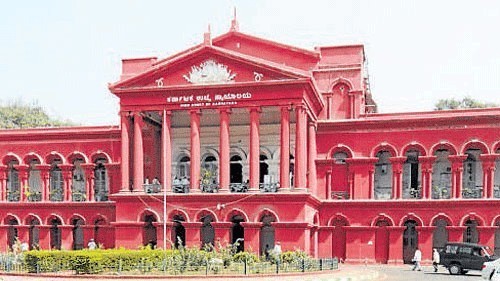
The Karnataka High Court.
Credit: DH File Photo
The 27th edition of the Bengaluru Tech Summit is scheduled for November 19-21 and pitches itself to be Asia’s largest tech conclave, with over 50,000 tech enthusiasts from India and delegations from over 40 countries expected to be in attendance. In addition to the Tech Summit, the Government of Karnataka is driving various initiatives, including the 2025 Global Investors Meet and the Invest Karnataka Summit, to attract both domestic and international investments into various sectors. The numbers speak for themselves: In his 2024 budget speech, the chief minister stated that Karnataka attracted Rs 88,150 crore investments in 2023-2024.
While it is evident that the state is clearly focussed on building a regulatory environment conducive to investment, it appears to be falling short in building the necessary infrastructure to protect and enforce investor rights in case of disputes.
It is well settled that a fundamental element for the ease of doing business is the presence of dispute resolution mechanisms that are both cost-effective and time-sensitive. However, Karnataka’s district courts and high court are overburdened with ever-growing caseloads, prompting parties to actively choose alternate dispute resolution (ADR) methods such as arbitration and mediation to resolve their disputes outside court.
This widespread adoption of ADR mechanisms in commercial transactions is in line with global trend towards dispute resolution in a flexible manner, where adjudication is done by experts nominated by parties in a time-bound manner, with the assurance of confidentiality and privacy.
In recognition of this, the Ministry of Law and Justice is taking numerous steps to promote and strengthen the use of ADR mechanisms, including but not limited to, the proposed amendments to the Arbitration and Conciliation Act. The Union government here appears to be making a hard push for the use of mediation, which is demonstrated by the enactment of the recent Mediation Act, 2023, and departmental policies pushing for mediation to be opted for as the first choice of resolution of disputes prior to full-scale litigation.
Karnataka recognises and acknowledges this position. In fact, the Law Department of the Government of Karnataka, in its 2021 Dispute Resolution Policy, has a dedicated section to the adoption and incorporation of ADR mechanisms in government disputes. However, mere recognition of this position does nothing, as the state of affairs on the ground narrates a different story. An example would be the state of affairs at the Arbitration & Conciliation Centre in Bengaluru, which is an initiative of the Karnataka High Court.
The state government, in its 2024-2025 budget, has allocated a paltry sum of about Rs 1.95 crore for the functioning of the centre. The sum is expected to cover the day-to-day functioning of the centre, with no proposed plans for its expansion and improvement of infrastructure on-site, despite numerous calls for the same from members of the Bar. Similarly, the state government has appointed a sum of about Rs 2.2 crore to the Bangalore Mediation Centre, despite the massive push of the central government towards mediation. To put these numbers into context, it is reported that the government is expected to spend over Rs 110 crore towards the 2025 Invest Karnataka Summit, which will include expenses relating to hosting the event, associated publicity, and appointment of knowledge partners for the event.
The state must understand that merely placing pen on paper in this regard is insufficient. It needs to actively engage with the judiciary and other appropriate stakeholders to bolster Karnataka’s capabilities in ensuring that the state is equipping itself to be a preferred hub for dispute resolution, starting with increased investments in physical infrastructure and intellectual capital.
Karnataka can take cue from Maharashtra in this regard. For instance, the Government of Maharashtra has been the first state to adopt an institutional arbitration policy, where all commercial contracts of the state government over a value of Rs 5 crore will mandatorily contain an institutional arbitration clause. It has also invested heavily in improving its infrastructure, such as supporting the establishment of the Mumbai Centre for Indian Arbitration, which is now a preferred choice of institution for domestic and international parties for resolution of commercial disputes. These initiatives, among many others, have put Maharashtra at the forefront of dispute resolution in India.
The responsibility of the state government does not end with merely laying down a red carpet during investor summits or by offering tax cutbacks and other such incentives. With the government being one of the largest litigators in the state and across the country, it is in the best interest of the state to proactively take measures to improve the systems in which they choose to litigate.
(The writer is a practicing advocate in Bengaluru)